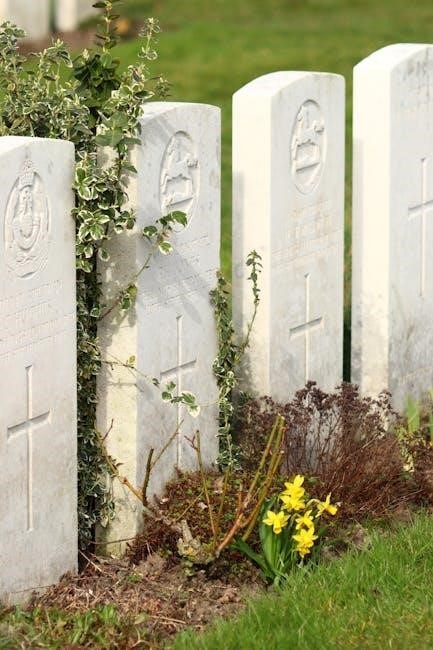world war 1 dbq answer key pdf
Get the ultimate World War 1 DBQ answer key PDF! Perfect for students and history enthusiasts. Free download available now!
1.1. Overview of the DBQ Format and Purpose
The World War I DBQ requires analyzing primary sources to evaluate the war’s impact on global relationships and colonial dynamics, emphasizing historical context and critical thinking.
The DBQ (Document-Based Question) format requires students to analyze primary sources and historical context to address a specific question. For World War I, the DBQ often focuses on themes like the war’s impact on colonial relationships or its underlying causes. Students must read and annotate the prompt, source documents, and apply critical thinking. The purpose is to evaluate historical events’ significance and connections, fostering deep understanding and evidence-based argumentation. Proper analysis involves identifying document authors, purposes, and historical contexts, ensuring a comprehensive and well-supported response. This approach helps students develop essential historical thinking skills.

1.2. Importance of the DBQ in Understanding World War I
The DBQ is a crucial tool for understanding World War I, as it encourages in-depth analysis of primary sources and historical context. By evaluating documents, students gain insight into the war’s complexities, such as its causes, key events, and global impacts. The DBQ fosters critical thinking and evidence-based reasoning, helping students connect historical events to broader themes. It also highlights the war’s significance in shaping modern international relations and societal changes. Through this approach, learners develop a nuanced understanding of World War I’s lasting legacy and its influence on colonial and European dynamics. This skill is essential for historical inquiry;
Key Causes of World War I
The war stemmed from nationalism, alliances, imperialism, and militarism, with the assassination of Archduke Franz Ferdinand sparking the conflict, fueled by complex political tensions.
2.1. Nationalism and Its Impact on European Tensions
Nationalism played a pivotal role in exacerbating tensions across Europe before World War I. It fostered a strong sense of national pride and loyalty, often at the expense of neighboring countries. This ideology led to heightened competition among nations, particularly in regions like the Balkans, where ethnic and nationalist movements sought independence. Nationalist sentiment made it difficult for countries to compromise, creating an environment where even minor disputes could escalate into broader conflicts. The assassination of Archduke Franz Ferdinand, driven by nationalist motives, ultimately triggered the war, showcasing nationalism’s destructive potential.
2.2. Imperialism and the Scramble for Colonies
Imperialism significantly contributed to the tensions leading to World War I as European powers competed for colonies and resources. The scramble for Africa and Asia intensified rivalries, particularly between Britain, France, Germany, and Belgium. Colonial possessions were seen as symbols of national power and economic strength. This competition led to conflicts over territories and resources, creating alliances and animosities that would later fuel the war. The exploitation of colonies for raw materials and markets deepened economic tensions, while the pursuit of empire heightened nationalistic fervor, making diplomatic resolution of disputes increasingly challenging. This rivalry laid the groundwork for broader conflict.
2.3. Militarism and the Arms Race in Europe
Militarism played a pivotal role in the lead-up to World War I, as European nations engaged in an intense arms race. Germany’s rapid naval expansion, challenging Britain’s dominance, and France’s emphasis on military strength heightened tensions. The buildup of standing armies and advanced weaponry created a climate of fear and competition. Nations believed a strong military was essential for security, fostering an atmosphere of readiness for war. This arms race not only increased economic burdens but also made diplomatic resolution more difficult, as the mere existence of large militaries incentivized their use. The glorification of military power further escalated tensions.
2.4. The Complex System of Alliances
The complex system of alliances in Europe before World War I created a volatile environment where small conflicts could escalate into larger wars. The Triple Entente, consisting of France, Russia, and Britain, and the Triple Alliance, including Germany, Austria-Hungary, and Italy, divided Europe into two opposing blocs. These alliances, intended to maintain balance and security, instead fostered rivalry and tension. When Archduke Franz Ferdinand was assassinated, Austria-Hungary’s actions against Serbia triggered a chain reaction, as each nation honored its alliance commitments. This system of mutual obligations transformed a regional dispute into a global conflict, making neutrality nearly impossible and diplomacy increasingly difficult.

Major Events of World War I
The assassination of Archduke Franz Ferdinand sparked the war, followed by massive conflict involving European nations. Trench warfare dominated the Western Front, while the U.S. entered in 1917. Total war tactics and the 1918 armistice ended the conflict.
3.1. The Assassination of Archduke Franz Ferdinand
The assassination of Archduke Franz Ferdinand on June 28, 1914, in Sarajevo, Bosnia, by Gavrilo Princip, a member of the Black Hand, ignited World War I. This event triggered a chain reaction due to the complex system of alliances, leading Austria-Hungary to declare war on Serbia. Russia mobilized in support of Serbia, followed by Germany declaring war on Russia and France. This act of nationalism and political extremism is widely regarded as the immediate cause of the war, showcasing how a single event could escalate into global conflict.
3.2. The War in the Trenches: Conditions and Tactics

The war in the trenches was characterized by brutal conditions, including mud, disease, and constant artillery fire. Soldiers on both sides endured rat infestations, limited supplies, and psychological strain. Trench warfare led to stalemates, prompting the development of new tactics like tank deployments and mustard gas. These innovations aimed to break the deadlock but often resulted in massive casualties. The harsh environment and prolonged exposure to danger took a heavy toll on soldiers’ morale and physical health, leading to widespread shell shock and long-term psychological trauma. The trenches became a symbol of the war’s brutal and immobilizing nature.
3.3; The Role of the United States in the War
The United States initially maintained neutrality in World War I, focusing on economic interests and avoiding direct involvement. However, Germany’s resumption of unrestricted submarine warfare and the sinking of the Lusitania shifted public opinion. The U.S. entered the war in 1917, contributing significant military and economic support to the Allies. American troops played a crucial role in turning the tide, particularly in battles like the Argonne Forest. The war also spurred industrial mobilization and societal changes, with women entering the workforce in greater numbers. The U.S; emerged as a global power, though its late entry limited its direct casualties compared to European nations.
The Impact of World War I on Colonized Peoples

World War I significantly impacted colonized peoples, leading to exploitation, resistance, and independence movements. The war intensified anti-colonial sentiments, reshaping global power dynamics.
4.1. The Exploitation of Colonial Resources During the War
European colonial powers heavily exploited their colonies’ resources during World War I, extracting raw materials and labor to fuel their war efforts. Colonized regions were drained of resources, often leading to economic hardship and underdevelopment. This exploitation deepened inequality and resentment, fostering anti-colonial movements. The war intensified the extraction of materials like rubber, cotton, and minerals, while millions of colonial soldiers were drafted into European armies. This exploitation not only sustained the war but also laid the groundwork for post-war nationalist movements demanding independence and self-determination.
4.2. The Role of Colonial Troops in the War Effort
Colonial troops played a significant role in World War I, with millions enlisted from colonies in Africa, Asia, and the Caribbean. European powers utilized these soldiers in various theaters, often under harsh conditions. Despite their contributions, colonial troops frequently faced discrimination, poor treatment, and limited recognition. Their involvement exposed them to new ideas and fostered a sense of unity among diverse groups. However, the war also highlighted the exploitation of colonies, as soldiers were forced to fight for powers that oppressed them. This experience fueled post-war resistance and demands for independence in colonized regions.
4.3. The Rise of Nationalist Movements Post-War
The aftermath of World War I saw the emergence of nationalist movements in colonized regions, driven by the exposure of colonial troops to new ideas and the exploitation they endured. The war highlighted the hypocrisy of European powers, who fought for freedom while denying it to their colonies. This fueled demands for independence and self-determination, particularly in Africa and Asia. Nationalist leaders capitalized on widespread discontent, organizing movements that challenged colonial rule and sought to reclaim cultural and political identity. These movements laid the groundwork for the eventual decline of colonial empires in the mid-20th century.

The Treaty of Versailles and Its Consequences
The Treaty of Versailles imposed harsh reparations on Germany, leading to economic crisis and widespread resentment, while redrawing national borders and sowing seeds for future conflict.
5.1. The Harsh Terms Imposed on Germany
The Treaty of Versailles subjected Germany to severe reparations, totaling 132 billion gold marks, and drastically reduced its military and territorial holdings. These punitive measures led to economic devastation, hyperinflation, and societal unrest. The treaty’s “War Guilt Clause” further humiliated Germany, fueling national resentment and political extremism. Such harsh terms not only destabilized Weimar Germany but also created fertile ground for the rise of Adolf Hitler and the Nazi Party, setting the stage for the outbreak of World War II. The economic strain and national pride wounded by the treaty became catalysts for future conflict.
5.2. The Redrawing of National Borders
The Treaty of Versailles significantly altered Europe’s map, dissolving empires and redrawing borders based on ethnic and nationalist claims. The Austro-Hungarian and Ottoman Empires were dismantled, creating new states like Czechoslovakia and Yugoslavia. Germany lost territories such as Alsace-Lorraine to France and Saar to the League of Nations. Poland regained independence, gaining land from Russia and Germany. These changes aimed to reflect self-determination but often led to ethnic tensions and unresolved conflicts. The redrawing of borders sowed seeds of future discord, as many nations felt unjustly treated or excluded from the peace process.
5.3. The Rise of Resentment and Future Conflict
The Treaty of Versailles fueled deep resentment in Germany, particularly due to the harsh reparations and territorial losses. The war guilt clause humiliated the German people, fostering a sense of injustice. Economic hardships, including hyperinflation, exacerbated discontent. This bitterness created fertile ground for extremist ideologies, such as Nazism, to rise. Adolf Hitler exploited these sentiments, promising to restore German honor and power. The treaty’s punitive measures inadvertently laid the groundwork for World War II, as unresolved tensions and ambitions reignited global conflict. The aftermath of Versailles became a cautionary tale of how peace can sow the seeds of future war.
Document Analysis for the DBQ
Analyzing primary sources in the DBQ involves evaluating historical context, author perspectives, and evidence to construct a well-supported argument about World War I’s impact.
6.1. Evaluating Primary Sources
Evaluating primary sources involves analyzing the author’s perspective, historical context, and potential biases. For example, documents like John Chilembwe’s writings reveal colonial tensions, while the Treaty of Versailles highlights post-war repercussions. Historians use the HIPP framework: Historical context, Intent, Point of view, and Purpose. Understanding these elements helps assess the credibility and relevance of sources. Primary sources, such as speeches or treaties, provide direct evidence of historical events and ideologies. By critically evaluating these documents, students can construct a well-supported argument in their DBQ response, demonstrating a deep understanding of World War I’s complexities.
6.2. Integrating Historical Context into the Answer
Integrating historical context enhances the depth and accuracy of a DBQ response. For instance, understanding the pre-war tensions, such as nationalism and alliances, provides a foundation for analyzing documents related to the war’s outbreak. Additionally, recognizing the economic strain caused by the war and the Treaty of Versailles’ harsh terms helps explain post-war resentment. By connecting primary sources to broader historical events, students demonstrate a comprehensive understanding of how World War I reshaped global dynamics and laid the groundwork for future conflicts. This approach ensures a nuanced and well-supported argument.
The World War I DBQ highlights the war’s profound impact on global relations, fostering lasting legacies that shaped future conflicts and societal transformations.

7.1. Summarizing the Key Points of the DBQ
The DBQ evaluates the impact of World War I on relationships between Europeans and colonized peoples, emphasizing exploitation, military contributions, and post-war nationalism. Key points include the harsh Treaty of Versailles, its economic penalties on Germany, and the rise of resentment. The war accelerated decolonization as colonized troops gained political awareness. Nationalist movements emerged, challenging European dominance. The DBQ highlights how the war reshaped global power dynamics, fostering long-term consequences for both colonizers and the colonized. These themes underscore the war’s enduring legacy in reshaping international relations and societal structures.
7.2. The Lasting Legacy of World War I
World War I left a profound and lasting impact on global politics, society, and international relations. The Treaty of Versailles imposed harsh penalties on Germany, fostering resentment that contributed to World War II. The war accelerated decolonization, as colonized peoples gained political awareness and demanded independence. It also reshaped global power structures, leading to the rise of the United States and the Soviet Union. Economically, the war caused widespread devastation, with massive losses in lives, resources, and infrastructure; Technologically, it spurred advancements in weaponry and medicine. The war’s legacy is marked by its role in shaping the modern world order.

